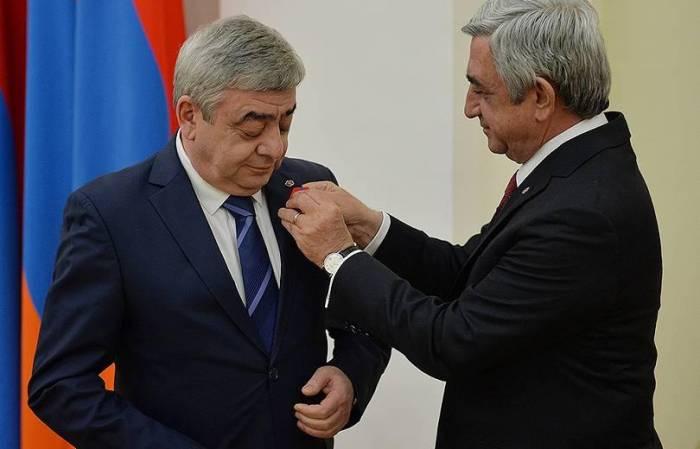Amid domestic turmoil, Sargsyan dreams of taking the helm of Armenia again Does Armenian society learn from its mistakes?
Armenia's third president Serzh Sargsyan recently lashed out at the Pashinyan government in a conversation with journalists, voicing provocative statements, touching upon the Armenian-Azerbaijani relations settlement process as well. In particular, he admitted that he believes it is necessary to sign a peace treaty, but on condition that the document does not imply concessions. Of course, Sargsyan did not miss a moment to reproach the Armenian leadership for "making concessions to Azerbaijan every time".
"We get information from foreign media thanks to 'leaks', and Armenian managers make concessions every time. Such a document cannot be called a peace treaty, it is rather a treaty of peace enforcement, it is the same capitulation," Sargsyan said, adding that after November 9 (November 10, 2020 - Ed.) Nikol Pashinyan became a capitulator forever, and after signing such a document he will become a capitulator twice as much.
This is not the first time Sargsyan has made such statements against the current prime minister: he made even harsher statements about Pashinyan being a "cowardly leader with the 'traitor label on his forehead" right after Armenia was defeated in the 44-day Karabakh war in 2020. Until then, Sargsyan almost disappeared from Armenia's political scene and refused to speak to local media. However, Yerevan's capitulation sent Pashinyan's rating down and that's when Sargsyan became active and started making revanchist statements. Thus, answering journalists' questions in February 2021, he vehemently vowed that "Karabakh will never be part of Azerbaijan".
Later, in June of the same year, in an interview with the Russian service of the BBC, he tried hard to convince the international public that he remained in power in 2018 after two presidential terms to solve the Karabakh conflict and start the reconciliation process. It should be recalled that in 2018 Sargsyan moved from the presidency to the prime minister's chair, which was just adjusted for him thanks to the constitutional changes. In fact, Sargsyan deceived his people. While implementing the constitutional reforms, he repeatedly declared that he was not going to stay at the helm of power after his second presidential term. But he could not part with power, for which he was ousted by Pashinyan and the "velvet revolution".

And now, on the threshold of another wave of instability inside Armenia, Sargsyan has raised his voice to remind society and the world about himself. He dreams of once again ascending to the top of the political Olympus in Armenia, although, if we look at it soberly, his chances of restoration are slim. This is mainly due to the fact that there is a clear understanding in Armenian society that the return of the Karabakh clan means the return of all the numerous vices that characterised the reigns of Kocharyan and Sargsyan. Armenia is hardly ready for such a thing.
Meanwhile, it is known that it was during Serzh Sargsyan's rule that the indicators of corruption, population flight, state debt and unemployment grew by leaps and bounds. For example, during the 10 years of Sargsyan's rule, more than 300 thousand people (10 per cent of the population) left Armenia, the state debt reached almost $11 billion, and the poverty rate reached 30 per cent. All this happened against the background of the rapid enrichment of Serzh Sargsyan and his numerous relatives. In particular, Armenia still remembers Sashik Sargsyan, who imposed a tax on all businesses in the country. Moreover, the name of Serzh Sargsyan's brother also popped up in drug trafficking and money laundering cases. According to media reports, Sashik was connected with Armenian authority Armen Ghazaryan, alias Pzo. Through Pzo and his men, Sashik got in touch with international representatives of the Armenian mafia and Russian criminal lords and participated in their criminal activities in Europe and the United States. Needless to say, the support of Serzh Sargsyan, which he provided to his brother throughout the entire period of his rule of Armenia, helped Sashik to remain out of prison.
That is, the return of the Karabakh clan to power in Armenia also means a return to the former corrupt model. It will inevitably destroy the "country of stones", which is already at the death's door. Armenian society is unlikely to give a second chance to Kocharyan or Sargsyan. Otherwise, it will suffer dire consequences of this ill-considered decision.








